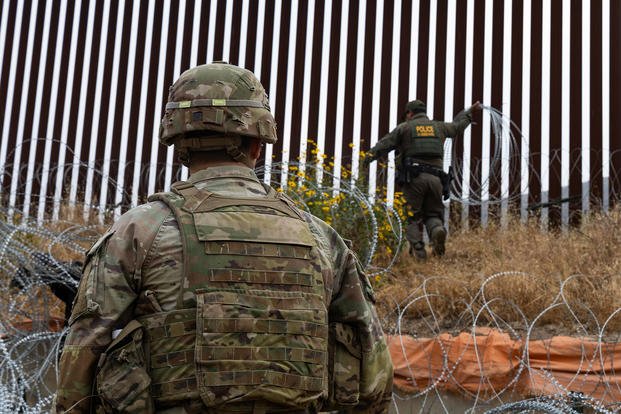Defense Secretary Pete Hegseth has ordered the military to take steps to encourage troops to consider being part of the agencies that handle immigration enforcement and border security though a new policy unveiled Thursday.
In a memo made public Thursday, Hegseth ordered the Pentagon to "prioritize and broadly advertise" opportunities troops who are nearing separation or retirement from the military have with either Customs and Border Protection or Immigration and Customs Enforcement as part of its SkillBridge program.
SkillBridge is a program that is intended to allow troops to take part in real-world job experience while in their final 180 days of military service. The idea behind the program is that it enables a smoother transition to civilian life and allows troops to be more competitive in their chosen industries or fields.
Read Next: Army Officials Pushed Back on Pop-Up MAGA Shop Ahead of Fort Bragg Trump Speech
"Recognizing the importance of leveraging talent and furthering our commitment to work with DHS [Department of Homeland Security], the department is expanding opportunities for transitioning service members to support southern border activities," Hegseth wrote in his memo, which was signed two weeks ago.
While troops have long had access to SkillBridge opportunities with CBP and ICE, the new policy would give those agencies greater emphasis, and commanders are encouraged to approve requests to work with either agency "to the maximum extent possible."
SkillBridge is a training program with no explicit promise of a job after a service member gets out of the military, but there is also a broad understanding that it is meant to act as a gateway to a position with the chosen company or agency.
A defense official told Military.com on Thursday that the current training opportunities with DHS include jobs like paralegal, program management and intelligence research specialists. The official added that none of the training opportunities includes law enforcement at this time.
Top Pentagon spokesman Sean Parnell called the move "an exceptional opportunity to ensure the best of America can continue to serve and defend their country."
The move is just the latest push that Hegseth has made to enable the military to more closely support the Trump administration's growing emphasis on security on the southern border and deportations of people they claim to be in the country illegally.
Nearly two weeks ago, Parnell also announced that Hegseth signed a memo that allowed Pentagon civilians to be detailed to the Department of Homeland Security -- the agency that oversees both CBP and ICE -- to better support "border security efforts, as well as interior immigration enforcement."
The defense official said that, while the civilian effort is still being worked out with DHS, the military branches can begin prioritizing troops taking advantage of SkillBridge immediately.
The memos are now two moves the Trump administration has made to more closely integrate the military with law enforcement as a way to expedite the widespread removal of immigrants on American soil, a move deemed alarming by legal and military experts.
Mark Nevitt, an associate professor at Emory University School of Law, said it was "odd" that Hegseth would put this memo out and that it raises a multitude of questions as it relates to integrating the military with immigration enforcement.
"What capacity are they working through SkillBridge?" Nevitt said to Military.com in an interview Thursday. "Hopefully, there's some sort of deep, deep, deep thought being put into that. And if the military member is still on an active-duty status, you would hope that they're very limited in what they're doing with SkillBridge other than more observing."
The announced deployments of the National Guard and Marines to support Immigration and Customs Enforcement agents amid protests in Los Angeles this week mark another mixture of those two agencies. Active-duty military forces are not allowed to conduct law enforcement activities under the Posse Comitatus Act, but the Trump administration has worked to push those legal boundaries.
Although Guardsmen in Los Angeles have been pictured doing traditional law enforcement-related tasks, like carrying riot shields and securing perimeters behind police tape, U.S. Northern Command has claimed on social media that troops "are not conducting civilian law enforcement activities."
Nevitt said another recent trend is that National Guard units, such as those in Texas and Florida, have partnered under "287g" Immigration and Customs Enforcement agreements, which allow them to perform certain immigration officer-type actions while under state orders.
"SkillBridge is part of this larger integration, and there's just a strong, strong desire in this administration to use every tool at their disposal to enforce immigration law," Nevitt said.
Related: Hegseth Suggests LA-Style Troop Deployments Could Happen Anywhere in US 'if Necessary'











